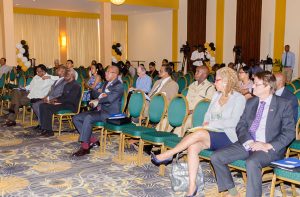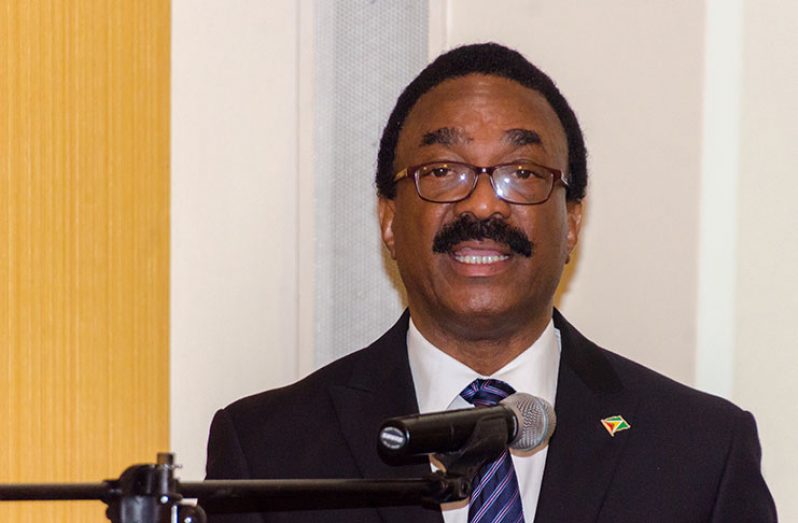–Greenidge tells consultation on Witness Protection Bill
SEVERAL concerns were raised on Monday during a public consultation forum on the Witness Protection and the Protected Disclosures (Whistleblower) Bills 2016, held at the Savannah Suite of the Pegasus Hotel in Kingston, Georgetown.Notwithstanding the handful of participants at that public consultation, the issues of confidentiality (non-disclosure), the state of inquiries, the lack of a political framework, consultative processes, and transparency were among the topics discussed.
Mike McCormack, co-president of the Guyana Human Rights Association (GHRA), said that, for the year, that entity had participated in three public consultations prior to Monday’s; and noted that each piece of legislation focuses on mechanisms that are to be introduced, but not political framework that can assess the usefulness of the legislation.
He spoke of past approaches to public consultations, which resulted in a “consultation paper, or green paper” being presented.
Based on the responses to the legislation, amendments would be made, and those would be taken to Cabinet on a white paper, after which the bills would be submitted to Parliament for approval.
Speaking on the issue of corruption, the GHRA co-president said there is no vigorous public procurement process that can speak to strict accountability. He said the bill does not address the major need to revitalise the notion of citizenship, and there is need for people who hold both public and private offices to be held accountable for their actions.
He reminded that the Commissioner of Information has been entirely silent for a prolonged period, and pointed to there being a “multiplicity of mechanisms” that lack the human capacity to be properly addressed.
He spoke of the need for a single Rights Commission with sub-commissions, as opposed to several Human Rights Commissions. Moreover, he is of the opinion that the country needs to have a Commission of Ombudsmen, as opposed to one Ombudsman.

Speaking specifically to the Witness Protection Bill, McCormack said there is “the continued resistance to gender neutral language in the bills.” He described the lack of gender neutral language as “offensive”.
More needs to be done at the level of stakeholders to ensure that instances of corruption are rooted out, said McCormack.
Chief Parliamentary Counsel Cecil Dhurjon accepted the many observations and comments made by the GHRA head, describing him as “enlightened”. The Senior Counsel noted, too, that the drafters of the legislation would bear in mind all concerns raised and try “to enrich” the legislation accordingly. It is not too late to take into consideration the concerns highlighted at the public consultation, he said.
Similarly, Foreign Affairs Minister Carl Greenidge, in brief remarks, alluded to the concerns raised by McCormack. He described the two bills as “complex but important”, and called on the drafters, the Attorney General’s Chambers and the Ministry of Legal Affairs, to “pay attention to the point being made by Mike Mc Cormack”.
Minister Greenidge said it is obviously true what Mc Cormack had referred to as public conformity and private dissent. He said it is a fact that, to a large extent, the failure to enforce the laws has caused this state of affairs. He opined that perhaps the process by which consultation and decision-making is made needs to be more open and extensive.
He believes that institutions need to be put in place to allow for “a more realistic dialogue”, rather than the public’s unwillingness to express their views and concerns without being harassed.
The minister noted the challenges small societies like Guyana face in trying to tackle witness protection. He said no matter how much a person’s name and background are changed, people can still be identified.
“It is rare that you can take a Guyanese and carry them in a community and they won’t be recognised,” he said, while noting that there are both advantages and disadvantages in the witness protection programme.
However, he said, the option exists for those in the programme to be relocated to other CARICOM jurisdictions as a means of protecting their identities. Like those who spoke at the public consultation, Greenidge said the issue of information and confidentiality is important, but information is always in the public domain.
He said there is no easy or definitive solution to that problem. “I don’t expect that the legislation drafted can solve that problem,” he remarked.



.jpg)











